#enough themes and motifs floating around in here to kill a person
Explore tagged Tumblr posts
Text
Up at an ungodly hour being sad about Ultrakill fic things I haven't even written yet but manifested into being because the music hit my brain just right oops-
#chris's ramblings#ultrakill#ultrakill oc#im up because it's one of the only times i can focus and do work#since my sleep schedule is fucked#and this is what my brain does to me#i need to start writing charlotte's fic asap so i can actually commit these scenes to paper. screen. what have you.#enough themes and motifs floating around in here to kill a person#*rattles her and gabe gently*
10 notes
·
View notes
Text
Favorite Albums of the 2000s
10. In Rainbows- Radiohead

After Radiohead released Hail to the Thief it seemed pretty set in stone that while they may still go on to continue releasing great records, it’s unlikely that they’d ever put out another record that shatters expectations and makes a bid for being among their best work. And then we received In Rainbows, a shocking late-career game changer so assured, dynamic, and brilliant that there are music fans that came of age around its release that still claim it’s the best Radiohead album. It’s not, but it’s exceptional nonetheless; a perfect fusion of the art-rock, electronic rock, and avant-guard impulses that they’d seem to have perfected by the time Kid A dropped, but had never quite navigated so fluidly. It’s a best of both worlds record that’s lean, perfectly paced, and contains some of the strongest songwriting of Thom Yorke’s entire career. It was the first Radiohead record since Kid A to sound like a revelatory statement able to stand on its own, and not simply exist in the shadow of prior records. The pay what you want model that they used to sell the record was a game-changer at the time of its release, but it’s the warm orchestration, frigid beats, and dynamic range that gave this record the staying power that it has. It’s the kind of record that displays an assured effortlessness that belies what exceptional musicians they all are, and reminds you why you fell in love with the band in the first place.
The one-two punch of “15 Step” and “Bodysnatchers” sets the pace for what’s to come; the former a glitchy electronic song that seems to hint at a less claustrophobic approach to Amensiac before the latter, propelled by a motorik rhythm and Yorke’s fractured wail, erupts and shatters that notion. The two of these songs taken together give a fairly apt depiction of the poles that Radiohead where bouncing back and forth from, and the tension arising from that balancing act propels the record forward. Caught between the somber guitar ballad “Nude” and the lumbering, electronic midpoint crescendo “All I Need” is the fidgety, nimble guitar work of “Weird Fishes/Arpeggi” which does a wonderful job of offsetting the dreaminess of the previous track and preparing you for the creeping dread of what immediately follows. “Faust Arp” is a welcome, jangly transition from the heaviness of “All I Need” into the album’s most accessible song, “Reckoner”, and through that song’s warm melody and infectious percussion the downtempo march of “House of Cards” sounds like a perfect transition, with its string drones setting the stage for the record’s best song to arrive. There isn’t a moment wasted throughout the entire record, and it’s a marvel to hear the band cover such vast ground and still end up with something so concise.
Being a Radiohead record it should come as no surprise that In Rainbows tackles themes of existential dread, apocalyptic visions, corruption, and alienation throughout. “Nude” grapples with groupthink, the tendency for societies to not operate in the best interests of its people, and the inherent emptiness that defines the human experience “You paint yourself white/And fill up with noise/But there’ll be something missing”. “Bodysnatchers” explores someone faking their way through life and being unable to live the way they truly are “I have no idea what I’m talking about/I’m trapped in this body and can't get out” while “Faust Arp” finds someone crushed under the weight of monotony, recognizing the issue but seemingly lacking the courage or conviction to change his surroundings “Dead from the neck up, I guess I’m stuck, stuck, stuck/We thought you had it in you/But no, no, no”. “Videotape” ends the record on a perfect thematic note with the narrator making a videotape for the love of his life before he kills himself “No matter what happens now/You shouldn’t be afraid/Because I know today has been/The most perfect day I’ve ever seen”, drawing an unsettling through line from the closer on Kid A. The themes of despair throughout the digital age have become increasingly more realized with each subsequent Radiohead album from OK Computer onward, but they hit a notable new peak on In Rainbows. In Rainbows isn’t their most ambitious, or accomplished album, but it perhaps best distills what their essence best, succinctly showcasing just how peerless they were and remain.
Essentials: “Jigsaw Falling Into Place”, “All I Need”, “Weird Fishes/Arpeggi”
9. The Glow, Pt. 2- The Microphones

Before Phil Elverum recorded two devastating records about the loss of his wife, Genevieve, and the process of having to raise his daughter without her by his side under his current Mount Eerie moniker, he spent several years recording lo-fi psychedelic folk songs as The Microphones. He switched gears in 2003 and continued recording music as a solo act, having swapped the name of The Microphones for Mount Eerie (the name of the final record recorded as The Microphones) feeling that he had taken the former project to its natural conclusion. Before making the switch, Elverum recorded four albums as The Microphones that each rank as among the most accomplished and thoroughly engaging albums that he’s recorded to date. While all are exceptional and worth anyone’s time, The Glow Pt. 2 is the best of the bunch, and still stands as Elverum’s magnum opus. An idiosyncratic LP bursting with personality and color while folding in psychedelic folk, noise, lo-fi, ambient, and indie rock The Glow Pt. 2 is a colossal tour de force through Elverum’s tastes, and it hangs together remarkably well. He would continue to explore various facets of styles explored here on subsequent releases, but no single record of his before or after captures the vivid imagination and breadth of his musicianship quite like The Glow Pt. 2.
Opener “I Want Wind to Blow” sets the stage for what’s to come through gentle acoustic strums, repetition, and a generous use of space while growing increasingly grand in scope until it explodes during its last minute with pummeling percussion and thick slabs of distorted noise. “I Want Wind to Blow” is one of the longest songs here, with most ranging from 1 to 2 minutes, just long enough to begin exploring an idea and then smoothly transitioning to something else before wearing its welcome. There are songs like “(Something)” that drift by quickly with little more than droning strings floating eerily throughout the mix, and others like “Map” that are a treasure trove of eclectic instrumentation that seem to be constantly rising and falling in intensity for several minutes without locking into a steady groove for too long. “Headless Horseman” gets a ton of mileage out of a softly strummed ukulele and Elverum’s tender vocals while the menacing “I Want to be Cold” pits a searing cymbal rhythm against smoldering, distorted guitars with Elverum’s voice barely audible above the noise. The individual songs may run the gamut through a myriad of different genres, but the analog warmth, droning motifs, tape hiss, and punctual silence tie everything together as one vast landscape of thematic and sonic coherence. No matter how far ranging some of the songs here develop with respect to everything else around them, the production renders each song with the same unmistakable warmth and richness.
The Glow Pt. 2 is centered around a breakup that Elverum experienced, and he details his thoughts and feelings throughout the ordeal, consistently blurring the lines between fact and fiction while gradually finding solace in nature. “I Want Wind to Blow” opens the record right after the storm has died down as he begs for a change to sweep away the sense of loss that he’s beginning to endure “My clothes off me, sweep me off my feet/Take me up, don’t bring me back/Oh, where I can see days pass by me/I have no head to hold in grief”. This leads directly into the record’s centerpiece and title track where Elverum comes to terms with the fact that his girlfriend and best friend became romantically involved with one another. Elverum recognizes that life will go on whether or not he wants it to in that moment “I could not get through September without a battle/I faced death, I went in with my arms swinging/But I heard my own breath/And I had to face that I’m still living”, and slowly works his way back towards the resolve to go on. Throughout the rest of the record he tries to erase memories of the relationship (“The Moon”), succumbs to pure apathy (“I Want to be Cold”), comes to terms with how insignificant he is within the scope of the universe (“I Felt My Size”), and eventually comes to terms with what remains of his life as he slowly bleeds out in the forest (“My Warm Blood”). The experience that Elverum draws from throughout The Glow Pt. 2 is universal, but it’s rarely been translated into such a rich, transcendent experience.
Essentials: “I Want Wind to Blow”, “The Glow, Pt. 2″, “Map”
8. Since I Left You- The Avalanches
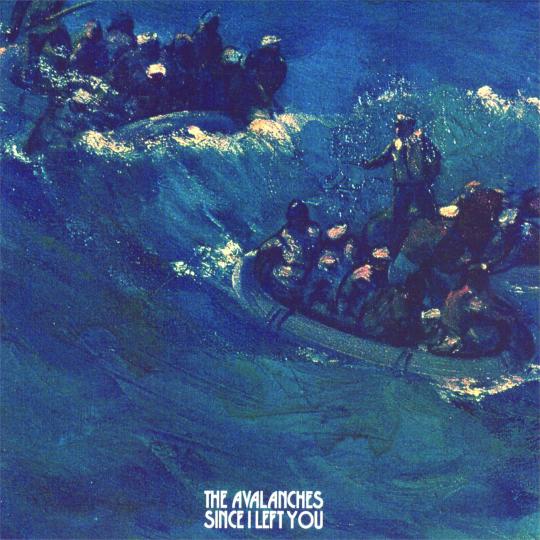
While the last decade saw the release of many brilliant records, there were very few that were as legitimately inventive as Since I Left You. The debut album by The Avalanches is a plunderphonics record that seamlessly blends disco, r&b, jazz, bossa nova, comedy skits, and pop music into a glorious, kaleidoscopic whole that truly sounds like nothing else. SILY wasn’t the first plunderphonics record, but nothing working entirely within those parameters before or since has achieved something so fresh and singular, creating a colorful, fully-lived in new context for the 900 plus samples that make up its whole. The perfectly natural flow that guides the record is part of its inherent charm, and belies just how intricate and complex the creation of the record actual was. SILY was so painstakingly meticulous to construct that it took The Avalanches 16 years to return with a proper follow-up, and while that follow-up, Wildflower, was a great return to form, it doesn’t quite capture the singular beauty of their inimitable debut.
The eclecticism of SILY is one of the most immediate, and impressive draws. There are recurring samples and motifs that occur multiple times throughout the record, but no two songs sound anything alike. The pacing is sublime, with songs bleeding into one another in a manner that approximates a DJ mix with supreme versatility. Samples are constantly shifting, being pitched in different directions, being sped up, slowed down, or swapped out entirely. There’s never a moment where something isn’t in flux, and the fact that they manage to accomplish this while still constantly giving each song such a defined shape and tone is a marvel. Sampled voices appear periodically, but rather than leading the arrangements, in true plunderphonics fashion they're tucked into the fold alongside everything else, treated as percussion or texture depending on the song. No single moment overstays its welcome, and because of how much texture is being employed at all times it’s easy to constantly discover something new each time that you listen to it. The last song on SILY transitions seamlessly into the first song, which only heightens the potency of its DJ mix structure.
With a record as coherent and consistent as SILY it’s difficult and almost beside the point to zero in on highlights since it’s meant to be consumed all at once as an experience. But there are a few astonishing songs that stand above the already strong pack, and rank as among the strongest plunderphonics songs that I’ve ever heard. “Two Hearts in ¾ Time” unloads a swirling concoction of xylophone, flute, and keys atop breezy scat singing, and the carefree exuberance that radiates from the composition is infectious. “Radio” pits a massive bassline against repetitious chants and distorted bursts of guitars and keys while “Summer Crane” pairs down the sonic density (slightly) as a slurring thermin, strings, and sleigh bells dance in tandem while the recurring string motif flickers throughout. “Frontier Psychiatrist” is as ridiculous and absurd as things get here, and is legitimately one of the funniest moments on any electronic album through its use of vocal samples lifted from the Johnny Wayne and Frank Shuster comedy sketch of the same name “The man with the golden eyeball/And tighten your buttocks, pour juice down your chin/I promised my girlfriend I’d play the violin. And the closer “Extra Kings” unravels in a bouncy psychedelic sprawl with the voice from the first song and title track singing “I’ve tried but I just can’t get you/Every since the day I left you” as noise makers and woodwinds swirl around the vocals in rapturous joy.
The one thing that cannot be overstated is just how much fun it is to listen to this record. Through its many songs and moods, joy, pain, sorrow, regret, and unease are conjured at various moments, but throughout it all there’s a palpable sense that the band are thoroughly enjoying themselves. It remains playful and whimsical even at its most crestfallen, and thrills even at its deepest lulls. A sense of discovery and communal spirit animates this record, and The Avalanches achieve a sense of weightlessness that pervades even the record’s densest moments. It’s the rare record that matches its remarkably accessible, party-friendly nature with an equally groundbreaking execution that completely rewrote the cultural relationship to sample-based music. The Avalanches wisely opted to downplay the inherent brilliance of the music, and they made it as easy as possible to simply get lost in the endless spirals of grooves, texture, and pockets upon pockets of melody. There’s no air of pretension in The Avalanches’ universe, just the pure, unmitigated joy of stumbling upon new sounds in unusual contexts again and again and again.
Essentials: “Extra Kings”, “Frontier Psychiatrist”, “Two Hearts in 3/4 Time”
7. Yankee Hotel Foxtrot- Wilco

Wilco was already a great band before they released Yankee Hotel Foxtrot, but it’s this record that cemented them as one of the most compelling of their era. When their label, Reprise Records, an imprint of AOL Time Warner, heard the record they assumed that it would essentially amount to career suicide and opted to release them from the label with the rights to the album. In order to not significantly delay the release of their record before touring it as well as controlling the quality of the songs that were already being leaked from it Wilco put the entire record on their site and embarked on their most successful tour up to that point. Both Being There and Summerteeth were massive leaps forward for the band, defined equally by Jeff Tweedy’s increasingly accomplished songwriting and the studio wizardry of multi-instrumentalist Jay Bennet, but on YHF these forces hit a peak. The songs on YHF are intensely felt, and earnestly conveyed by a band that was completely in-tune with one another, and were perpetually firing on all cylinders. The tasteful sonic experimentation, warm rock and baroque arrangements, and Tweedy’s wistful, romantic sentiments coalesce into a superbly realized whole. Mature, earnest, empathetic, and adventurous, YHF is a landmark for indie rock, and one of the most beautiful and compulsively listenable albums of the century so far.
The biggest development that took place on YHF was Tweedy’s songwriting fully blossoming into a sincere, singular voice that propelled to the band to unprecedented heights. On opening song “I Am Trying to Break Your Heart” Tweedy’s depiction of someone wandering around Chicago post-breakup “I am an American aquarium drinker/I assassin down the avenue/I’m hiding out in the big city blinking/What was a I thinking when I let go of you?” sets the tone of the album with wistful, poignant urgency. “Jesus, Etc” depicts the desolation and the simple pleasures clung to within urban, contemporary American life “Voices whine/Skycrapers are scraping together/Your voice is smoking/Last cigarettes, are all you can get/Turning your orbit around” while positing love as a balm for the ills of modern existence “Our love is all we have/Our love/Our love is all of God’s money/Everyone is a burning sun”. On the album’s stunning closer “Reservations” Tweedy’s trying to reassure his love that he’s invested in their future “Oh, I’ve got reservations/About so many things/But not about you” while on the album’s centerpiece, “Radio Cure”, Tweedy laments the difficulty of sustaining a long distance relationship despite advancements in technology making it easier to do than ever before “Oh, distance has no way/Of making love understandable”. Tweedy’s writing is concise and direct, cut with an emotional through line that elevates the sentiments beyond what may scan as initially simplistic.
YHF doesn’t provide any overhauls to their approach to the extent that Wilco’s previous two records did. Rather, it’s a case of tightening up what they already did well and improving considerably on all fronts. Jay Bennett continues to showcase how he was the band’s not-so-secret weapon at this phase of their career with a sly touch that embellishes each song here with surprising amount of dimension. Bennett really began to experiment considerably with Wilco’s sound on Summerteeth, but his most compelling contributions are those throughout YHF. Whether its the ambient swirl of chimes that open “Ashes of American Flags”, the spring-loaded percussion on “Pot Kettle Black”, the melancholic string drones that dominate “Poor Places” or the whirring samples that swirl in perfect harmony alongside the infectious concoction of cymbals, xylophone, and acoustic guitars throughout the build of “Radio Cure”, Bennett’s use of texture was subtle, but supremely effective in fleshing each composition into wonderfully distinct shapes. The songs are certainly strong enough to stand on their own in much simpler, stripped down forms, but Bennett’s tinkering perfectly complemented Tweedy’s songwriting, imbuing his romanticism with a welcome surrealist bent.
The suspected allusions to 9/11 in a few of the songs despite the record having been finished months before 9/11 dominated the narrative of the album upon its release, but that supposed prescience overlooks Tweedy’s astute observation of American despair and generally just glosses over the fact that, regardless of possible foresight, YHF is simply a magnificent record. There’s a universality to the sentiments that are beautifully rendered by Tweedy’s aching tone, and the band finally seemed completely comfortable dropping all pretenses of “alt-country” and leaned unabashedly into their intrinsic weirdness without much concern for what the record might initially scan as. What continues to really impress about YHF is that Wilco simultaneously became more experimental and tuneful, with some of the melodies dominating songs like “Radio Cure”, “Jesus, Etc”, “Pot Kettle Black”, and “I’m the Man Who Loves You” ranking as among their strongest to date. There are few albums that I’ve heard that strike such a fine balance between strong melodies and forward-thinking composition, but YHF manages just that, while offering a compelling insight into initial 21st century American malaise.
Essentials: “Radio Cure”, “I Am Trying to Break Your Heart”, “Jesus, Etc”
6. Madvillainy- Madvillain

MF DOOM and Madlib were already renowned figures in underground hip hop with a couple of great records under each of their belts before they linked up to write and record Madvillainy. But in each other they found the perfect collaborator whose sensibilities ran parallel to their own. In the universe that they built together dense internal rhymes float effortlessly over dusty soul loops and thick clouds of pot smoke. There were obvious precedents for what they accomplished on DOOM’s Operation Doomsday and Madlib’s The Unseen, recorded under his Quasimoto alias, but on Madvillainy they helped one another reach a creative breakthrough with them both redefining the form of their respective crafts. Madlib’s beats are relentlessly eclectic, gorgeously textured, and masterfully mixed, while DOOM’s verses are some of the most varied, superbly rapped, and thought-provoking of his entire career. The ease with which their styles complement one another belies the effort that they put into it, and the end result doesn’t sound fussy or labored over, but it did herald a new era of faded west-coast hip hop built on a throne of comic books, jazz records, and a dizzying array of internal rhyme schemes.
The production on Madvillainy was handled entirely by Madlib, with DOOM co-producing the opening track “The Illest Villains”, and it’s the most cohesive collection of beats that Madlib has ever assembled while still packing a considerable amount of variety within its grooves. “Rhinestone Cowboy” is the longest song, clocking in at 4 minutes exactly, but most of the songs are under 2 minutes and concisely introduce their ideas while DOOM unloads brief, but substantial bars over them. The samples span the likes of The Mothers of Invention, Sun Ra, George Clinton, Bill Evans, Diana Ross, Stevie Wonder, James Brown, Street Fighter II, and so much more sometimes within the same songs without once showing the seams. The atmosphere is soulful and jazzy with a hazy tinge that the samples lend the compositions on the whole juxtaposed superbly against the visceral nature of DOOM’s rapping. The music is rendered within a quantized grid so there’s no mistaking it as anything other than hip hop beats, but these beats are arranged more tastefully than the vast majority of instrumental hip-hop that’s come before or since. Whether it's the guitar/sleigh bell stomp of “Shadows of Tomorrow”, or the sluggish bass crawl and metronome sigh of “Meat Grinder”, or the anthemic brass leads that frame “All Caps”, the beats are simply bursting with texture and personality.
Since reemerging as MF DOOM towards the end of the last century Daniel Dumile has completely owned this specific lane of verbose, off-kilter hip-hop defined by his knotty phrasing, complex internal rhyme schemes, and magnetic personality that draws from all ephemeral of pop culture. Madlib brings out the best in DOOM, and his rapping is by turns loose and tight, dense and reference heavy while delivered with a level of precision that transcends pop culture acumen. “Living off borrowed time, the lock ticks faster/That’d be the hour they knock on the slick blaster” are the first lines on “Accordion” that open the record, and things only get more surreal from there. The rhymes are eloquent and guttural, often open to various interpretation, and packed with colorful imagery while never being anything less than thought-provoking. “Meat Grinder” depicts DOOM’s pimping of a stripper named China “Heat niner, pimping, stripping, soft sweet minor/China was a neat signer, trouble with the script” while “America’s Most Blunted” is an absurdist ode to marijuana “Quas, when he really hit star mode/Never will he boost loose Philies with the bar-code”. “Curls” reveals a glimpse of DOOM’s lost innocence after smoking his first spiff at 7 “Spliff made him swore he saw heaven, he was seven/Yup, you know it, growin’ up too fast/Showin’ up to class with Moet in a flask” while on “All Caps” he’s reveling in pure braggadocio “So nasty that it’s probably somewhat of a travesty/Having me, then he told the people “You can call me your majesty””. The complexity and eclecticism that DOOM imbued his lyrics with hit a new peak for hip hop as a whole on Madvillainy.
Although the partnership between MF DOOM and Madlib only resulted in Madvillainy, the influence of that lone masterwork continues to ripple throughout the underground and mainstream alike. Odd Future, Brainfeeder, Black Hippy, Pro Era, Bruiser Brigade and countless other crews, collectives, and labels were informed tremendously by the nerve this record struck. DOOM clones are still rampant, and Madlib’s anything goes crate-digging approach to sample-based composition can be heard in everyone from Kaytranada to JPEGMAFIA. There were very few records that came out this decade that drastically altered the direction for what hip hop can sound like quite like Madvillainy. DOOM and Madlib were such a perfect match for one another that neither of them have made music with anyone else before or since (or solo) that comes close to the brilliance of Madvillainy. Whether or not the two of them ever reunite to create that tantalizing follow-up seems like a coin toss, but truth be told we’re better served with things as they are. The original is still paying enormous dividends 15 years later and it’s only going to continue getting better from here.
Essentials: “All Caps”, “Figaro”, “Curls”
5. Microcastle/Weird Era Cont.- Deerhunter

No other double LP from the last decade delivered so much, or asked so little from the listener, as Deerhunter’s extraordinary Microcastle/Weird Era Cont. Originally just intended as a single LP, Bradford Cox generously recorded all of Weird Era Cont. to reward fans that purchased Microcastle after it leaked months in advance (unfortunately, Weird Era Cont. would be leaked as well). Microcastle finds the band honing their populist impulses with impeccable clarity without completely abandoning their murkier roots, while Weird Era Cont. completely dives into their stranger, more abstract realm of their sound. Each record is exceptional in its own right, but when taken together they form the perfect realization of all the sides of the band, spanning the likes of garage rock, post-punk, shoegaze, ambient, musique concrete, krautrock, and psychedelic pop while managing to make such amalgamations sound like second nature. There’s more range covered on each of these LPs than most bands manage within entire careers. While Cryptograms first showcased the seemingly limitless potential that Deerhunter was capable of, Microcastle/Weird Era Cont. proved that they were one of the defining bands of the century so far.
Microcastle is sequenced in a way that is comparable to Cryptograms, but there are just a few more bright pop moments right out of the gates before the record descends into its shorter ambient middle section. After the obligatory ambient opening interlude, this time in the form of “Cover Me (Slowly)”, Lockett Pundt begins the record proper by taking lead vocals on Cox’s “Agorophobia”. Having Lockett sing the first actual song on the record is a testament to how far their lead guitarist had come as another vocalist (and songwriter, with “Neither of Us, Uncertainly”) in such a short order. With “Agorophobia” Lockett leads one of the gentlest sounding songs that the band had released up to that point, with a disarmingly gorgeous vocal melody superbly juxtaposed against lyrics that describe the sensation of being buried alive for sexual pleasure. The sharp immediacy of “Never Stops” follows suit, and here Cox completely comes into his own a pop frontman, no longer content to wallow innocuously behind the squall of guitar distortion, and he propels the arrangements with a legitimately anthemic melody. Both “Little Kids” and the title track provide two of Cox’s most tender vocal performances up to that point while still making room for Lockett’s spellbinding guitar tones.
“Calvary Scars”, “Activa”, and “Green Jacket” aren’t quite as engaging as any of the ambient songs throughout the stretch from “White Ink” to “Red Ink” on Cryptograms, but they nonetheless draw an effective bridge to the record’s high-point, the colossal “Nothing Ever Happened”. “Nothing Ever Happened” has the band firing on all cylinders and delivering a show stopping performance that blends krautrock, garage rock, and shoegaze for a song far more satisfying and life-affirming than the sum of its parts. After that rollercoaster we’re treated to the bouncy jangle pop of “Saved by Old Times”, and the soothing dream pop of comedowns “Neither of Us, Certainly” and “Twilight at Carbon Lake” before the later erupts into a cacophony of jerky guitar spasms. It’s a welcome ending for a record with such a clear emphasis on melody, and it reinforces the notion that you shouldn’t get too comfortable with any fixed idea of what Deerhunter sound like at any given point in time.
Weird Era Cont. is where things really get interesting. It’s the only album of theirs that includes songs that were recorded and performed by individual members of the band intended for their various solo projects (these being Bradford Cox’s Atlas Sound and Lockett Pundt’s Lotus Plaza). The album as a whole hews closest to the first Atlas Sound LP, Let the Blind Lead Those Who Can See but Cannot Feel, in that both are absolute treasure troves of sonic riches that prioritize pure sound and overall immersion above proper song structure. The fact that Weird Era Cont. is so disparate and yet hangs together so cohesively is as much a testament to Deerhunter’s discipline as it is their sheer intuition with respect to flow and pacing even amongst such inherent disorder. And so here you get the raucous garage rock anthem “Operation” colliding into the noise-pop gem “Dot Gain”, the ambient interlude “Cicada” seeping right into the twisted ethereal waltz “Vox Humana”, and the whirring instrumental collage pop “Moon Witch Cartridge” segueing nicely into the droning noise of “Weird Era”. While Weird Era Cont. is only strengthened when viewed through the lens of it existing as the flip side to Microcastle’s warped pop, it still provides a welcome microcosm of Deerhunter’s incredible range all on its own, and it’s the most adventurous record that Deerhunter ever recorded.
Due to the fact that Microcastle and Weird Era Cont. are both Deerhunter records, the lyrics deal almost entirely with dreams and death. Most of the characters that occupy these songs are trying to escape from their nightmares or literally sacrificing themselves for the sweet ecstasy of oblivion. A version of “Cavalry Scars” appears on both records, the former a brief guitar lullaby and the latter a blistering shoegaze freakout, but the constant thread that ties them together aside from the title is that the narrator is crucifying himself in front of all of his friends. “Saved By Old Times” is more literal, and it depicts the alienation that Cox experienced growing up in his parents house by himself after his parents divorced while trying to cope with his Marfan Syndrome “You are trapped in your basement for a war of 16 years/In a combat for victory/In a combat with ourselves/In combat with these cultural vampires”. Cox’s fixation on death seems to serve as the ultimate salve for his lifelong struggle with simply having to exist, and regardless of whether or not music functions as a temporary solution for his anguish it’s clearly a natural medium for him to exercise his demons. Deerhunter have spent the rest of their career honing in on that release, but Microcastle/Weird Era Cont. is where those fixations first crystallized into something truly singular.
Essentials: “Nothing Ever Happened”, “Never Stops”, “Microcastle”, “Vox Celeste”, “Dot Gain”, “Slow Swords”
4. Strawberry Jam- Animal Collective

Strawberry Jam was the first Animal Collective record to have been released after band member Panda Bear’s exceptional solo breakthrough, Person Pitch, so for the first time in their career there was an obvious precedent in place for where the tight knight crew of David Portner (Avey Tare), Panda Bear (Noah Lennox), Geologist (Brian Weitz), and Josh Dibb (Deakin) might take their sound, but like all their prior records it sounds nothing like anything that came before it. Having completely moved on from the full-band analog approach, SJ is the sound of a band moving fearlessly outside of their comfort zone and harnessing the immense potential of samplers. On the whole, the compositions are more richly textured, melodic, and better paced than the bulk of their past work. The band continued to incorporate field recordings into their music, but given the prevalence of the samples happening at all times it can be difficult to parse who’s doing anything other than percussion and vocals at any given point in time. Avey’s presence dominates SJ to a large degree, with his idiosyncratic approach to melody defining the bulk of the standouts here. But despite Tare’s voice being the focal point on most of the songs on SJ, Panda Bear still holds his own as a songwriter throughout, and his softer melodic tone helped superbly counterbalance Tare’s outbursts. On SJ you can hear the band bending the fabric of pop music to their will in real time, and it remains both a masterclass in warped pop, and a joy to revisit time and time again.
During the tour in support of their incredible 2005 psych-rock LP, Feels, Lennox was mesmerized by the look of a tray of inflight jam, and decided that the production on their next record should sound the way that the jam looked. On SJ the band capture that superbly as they deliver some of their strongest, and sweetest melodies coupled with Avey’s most abrasive, and expressive singing to date. This tug of war between the band’s heightened melodic instincts driving candy-coated, psychedelic arrangements against Tare’s octave leaping shrieks provides an entrancing juxtaposition that loses none of its potency from the frantic opening song “Peacebone”, to the longing closer “Derek”. Songs like “Chores” and the aforementioned “Derek”, both of which are Panda songs, execute sublime, unpredictable transitions midway through that demonstrate both his knack for sample-based composition and the West-African influence on his songwriting that really congealed in earnest on PP. Meanwhile Tare songs, like “Unsolved Mysteries” and “Cuckoo Cuckoo”, still favored conventional chord changes and verse-chorus-verse structures, but they managed to pack the hallmarks of the band’s sound into much more succinct packages that don’t nullify any of the impact. Neo-psychedelic synth textures, tribal drumming, choirboy vocal harmonies, feral shrieks, and a pervasive use of space still reigned supreme throughout SJ, but the band were crafting legitimate pop songs while still in service of their wonderful idiosyncrasies. Nothing on SJ could be mistaken for the work of any other band, but it’s remarkable to hear just how significantly they tightened up their arrangements while still still remaining an island unto themselves.
As soon as opener “Peacebone” kicks into gear with its stomping percussion and dazzling array of arpeggio synth leads setting the foundation for Avey’s full-throttled yelps, it’s clear that this is his record. At the time of its release, “Peacebone” was the most immediate that AC ever sounded, but Tare’s shrieks kept listeners giddily at arm’s length even as they adopt more approachable structures. The midsection breakdown is still thrilling, and a good barometer of whether or not SJ is really your cup of tea or not. “Unsolved Mysteries” follows suit and doubles down on the pervading sense of whimsy from a compositional standpoint, and Tare’s vocals continue to provide a satisfying juxtaposition. The backbone of the album consists of “For Reverend Green” and “Fireworks”, the strongest back to back songs on any of their albums. On “For Reverend Green” Tare provides one of his most thrilling vocal performances to date, gleefully leaping between octaves mid-verse and switching between cathartic wordless croons and feral shrieks on a dime. It’s a stunning display of virtuosity and passion that couldn’t have come from any other musician. “Fireworks” is one of Tare’s most tender vocal performances to date, and it finds him contemplating the cycle of life as well as his place in the world over stuttering percussion, wordless croons, mesmerizing field recordings, and minor key piano. It’s a touching, albeit heavy listen, but the band play with such joy and warmth that it never suffocates under the weight of its ambition, and it’s one of the greatest songs that Tare has ever written.
Despite SJ being an album dominated by Tare’s presence it was still a major showcase for Panda Bear as a songwriter in his own right. “Chores” nails the sort of transitional finesse perfected on PP as it starts from a frantic intro dominated by bass drums and noisemakers before seamlessly shifting into a brief droning mid-section and then ending on a psychedelic, West-African influenced march. The disparate movements sound nothing alike one another, but they’re stitched together in a way that not only flows incredibly well, but sounds completely natural. “#1” is the closest that the band get to one of their signature drone compositions, and although it’s far sparser, and not nearly as developed as most of their prior ones it works on the strength on Panda’s gorgeous vocals alone. The arpeggio synth melody, sleigh bells, and vocal samples provide a refreshing minimal framework on an album otherwise defined by maximalism, and gives Panda’s voice the kind of room necessitated for it to achieve its maximum impact. The finale, “Derek”, also clearly sprang from a PP compositional influence, with an intro full of chirping synths and tranquil organ chords that slowly give way to an explosive, double kick drum wall of sound beneath one of Panda’s most triumphant vocal melodies to date. It’s a massive sound, but his sentiments couldn’t be any more tender “You can count/When you count/Count on me/What do you/See when you/See inside of me”.
On SJ AC grapple with their adulthood, their lives as touring band, and the daily routines they now find themselves entwined in. Panda’s “Chores” is about him getting his chores out of the way so that he can get high in the rain while his closing contribution, “Derek”, finds him pondering the weight of having a living being depend on him for survival. None of Avey’s songs have the the playful energy of “Chores”, and he spends the album delivering a stream of consciousness on the nature of death (“Cucko Cucko), exploring the delusions that we buy into to feel okay about life (“Winter Wonder Land”), and the futility of living in the past (“Peacebone”). In addition to to being compositional standouts, “For Reverend Green” and “Fireworks” also form the emotional backbone of the album. The former explores the jovial existence of childhood against the crippling realities of adulthood “A running child’s bloody with burning knees/A careless child’s money flew in the trees/A camping child’s happy with winter’s freeze/A lucky child don’t know how lucky she is”. It almost plays like a spiritual successor to Tare’s masterful early song “Alvin Row”, and it perfectly exemplifies their ethos as a band. On “Fireworks” Tare contemplates the passage of time, acknowledging how quickly everything moves, and fantasizes about what bliss might look like to him “It’s family beaches that I desire/Sacred night where we watch the fireworks/They frighten the babies and you know/They’ve got two/Flashing eyes and if they’re color blind/They make me feel/That I’m all I see sometimes”. It’s a universal sentiment delivered with their singular charm, and one of their strongest statements to date.
On SJ AC retained their idiosyncratic whims and experimental proclivities, they just learned how to harness these elements into more immediate forms. As with each of their records released throughout the last decade SJ sounds nothing like what preceded it, but it’s too eclectic to be the work of any other band, and despite the shift in sonics it still operates by the dreamy logic that the band imbued it with. Each release following Danse Manatee has found the band creeping closer to full on pop, and although they embraced it unabashedly on SJ it’s still on their own terms entirely. SJ was the latest in a progression of records since Ark that found AC being ahead of the curve of several indie trends, and many of the sample-heavy indie acts throughout the end of the last decade owe their careers to this record. SJ isn’t AC’s most immediate record, nor is it their most challenging, but it is one of the most inspired developments within their progression, and it jump started their sample-based mature phase. MPP remains their most celebrated work, but the crystallization of their sound that took place on that record wouldn’t have been possible without the groundwork laid by SJ. Although SJ was overshadowed by PP the year that they both came out, SJ still stands as the best showcase of the band’s work with samplers, and it remains a landmark of experimental pop music.
Essentials: “For Reverend Green”, “Fireworks”, “Derek”
3. Kid A- Radiohead

Few artists have managed to make such a drastic leap in sound on any of their records the way that Radiohead did with Kid A. Throughout the 90s they developed organically from a run of the mill Brit pop band into one of the most idiosyncratic and forward thinking bands of all time. With their landmark 1998 record Ok Computer they created a blueprint for a form electronic rock equally informed by classical music and the various strains of experimental electronic music that emerged in the 90s courtesy of the likes of Aphex Twin, Boards of Canada, and Autechre. By the time that they were gearing up to record the follow-up to what was then unanimously recognized as their masterpiece they disavowed the form of rock music entirely. On Kid A the guitars are stripped away in favor of icy keyboards and the austere glare of syntheizers, with the stark precision of drum machines deployed to provide the heartbeat for their desolate soundscapes. The risk paid off immensely, resulting in a work that sounds like nothing that’s come before or since. It’s the sound of a band grappling with existentialism, early information overload, and the sweeping saturation of advanced technology and responding with doomsday prophecies that sound more prescient with each passing year. No other record released this century has better set the tone for everything to come quite the way that Kid A has.
As soon as Kid A’s opening song “Everything In It’s Right Place” begins it’s undeniable that a great deal has changed with Radiohead this time around. Despite the chilly exterior that Ok Computer exudes, there are still moments of melodic warmth such as on its opening cut “Airbag”. “Everything In It’s Right Place” presents an uneasy atmosphere at the offset, and things gradually become more foreboding from there. Thom Yorke’s heavily manipulated wail sounds like it’s glitching as it soars over the horizon of digital keys and kick drums. The mix slowly becomes an overwhelming wall of vocals and keys that form a repetitive bludgeoning motif, incorporating their heightened love of krautrock. Along with the classical music and IDM touchstones that informed Ok Computer, krautrock, jazz, and ambient were large influences they drew from as well. The title track follows “Everything In It’s Right Place”, and it’s an ambient lullaby that finds the band prioritizing atmosphere and texture over any semblance of conventional composition. On the following song, “The National Anthem” the band spiral into a propulsive epic that fuses jazz and krautrock into something else entirely. The first three songs sound nothing like one another, and in addition to the late album IDM stomp of “Idioteque”, they set the parameters for the record as a whole.
Despite the variety on display throughout Kid A it still achieves a remarkable cohesiveness through tone and atmosphere. Every song is masterfully paced, and exquisitely produced, and most blow open their sonic parameters further then they’ve ever dared before or since. “Optimistic” is one of the few songs here that hints at the sort of driving guitar compositions they prioritized early on, but when coupled with the forlorn melody and the eerie synth loops it almost sounds like an unsettling throwback that achieves a sense of perpetual weightlessness. “Treefingers” dives headfirst into ambient, and is one of the most gorgeous instrumental compositions that Radiohead have ever written. It also provides a superb bridge from the existential acoustic reverie “How to Disappear Completely” into the moody lurch of “Optimistic”. “Idioteque” is the pounding heart of Kid A’s detached overlook, but despite being the closest the album comes to a single it’s still claustrophobic and uninhabitable. After several songs that aim to instill dread and discomfort at every turn, the album’s last proper song “Motion Picture Soundtrack” ends things with a gorgeous harp arpeggio set against an organ wail as Yorke sings softly about a suicide fantasy. All these years later and Kid A continues to hold together as an astonishing collection of experiments from a band at the height of their powers.
Emerging at the dawn of the current century, Kid A didn’t commit to any pretenses of subtlety whatsoever, particularly with respect to its thematic concerns. On “Everything In It’s Right Place” Yorke lays out his perception of the state of a world laced with depression, anxiety, fear, and disconnection “There are two colours in my head/What was that you tried to say” informed by a breakdown that he experienced while touring Ok Computer. “How to Disappear Completely” takes the form of an out-of-body experience with a narrator thoroughly disillusioned with his life and ready to precede to the next plane of existence “In a little while/I’ll be gone/The moment’s already passed/Yeah, it’s gone”. “In Limbo” traffics in pure abstraction as the narrator wanders aimlessly throughout life unable to escape from his fantasies “I’m lost at sea/Don’t bother me/I’ve lost my way” while “Morning Bell” depicts a lingering spirit that supposedly resided in a house that Yorke used to own “The lights are on but nobody’s home/Nobody wants to be a slave”. The aforementioned “Motion Picture Soundtrack” provides a superb ending to the album rendered in bleak, cutting detail “Red wine and sleeping pills/Help me get back to your arms/Cheap sex and sad films/Help me get where I belong”, and it culmines with the narrator easing into suicide. The songs portray a grim culture of isolation and pacification that we’re much closer to living than we were when the album came out.
A year after Kid A Radiohead returned with their fifth LP, Amnesiac, but it mostly plays like a well-sequenced collection of thoughtfully repurposed leftovers from the Kid A sessions. Several great records followed suit, the latest being their sublime 2016 LP A Moon Shaped Pool, while various members of the band have spun off to focus on solo careers and film scores. Radiohead have never released anything less than a good record, but nothing since Kid A has come close to capturing the consistent brilliance of that record. The paranoia, uncertainty, and disillusionment that was pervasive at the turn of the century is rendered remarkably through their stark arrangements, liberal use of space, and distant temperament. The shift in Radiohead’s trajectory following Kid A was so pronounced that a band releasing their Kid A has become shorthand for the sort of dramatic, swinging for the fences left turn that's all too rare in music these days. While it’s almost certain that Radiohead will never release anything of this magnitude again, Kid A has held up incredibly well, and it continues to loom large as a relic of an already bygone era defined by a sense of wonder slowly being crippled beneath the weight of an encroaching dystopia.
Essentials: “Everything In It’s Right Place”, “The National Anthem”, “Optimistic”
2. Feels- Animal Collective
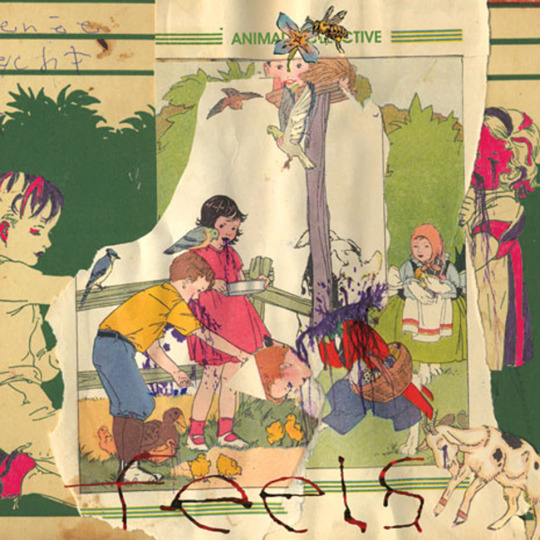
While Sung Tongs was the true breakout record for Animal Collective, Feels was where the band locked in as a full group to showcase that the remarkable melodic warmth peeking out through their intrinsic weirdness was far from a fluke. Avey Tare, Panda Bear, Geologist, and Deakin had all come together once before for Ark two years prior, but the pop craftsmanship, confidence, consistency, and sheer range displayed on Feels are worlds apart from the unsettling, freak-folk noise collages that define Ark. Psychedelia and drone music are still large facets of their sound, but they hadn’t previously been utilized to reinforce such strong song craft. Having moved beyond their freak-folk and noise roots, Feels was a departure towards presenting themselves as more of a conventional rock band, and it’s still the closest they’ve ever come to releasing any semblance of a traditional “rock” LP, but true to form Feels defies any easy classification. Guitars, drums, piano, and vocals dominate the proceedings to be sure, but so do dense field recordings, and otherworldly drones, particularly on the record’s spellbinding second half. While perhaps not their most adventurous, nor their most unpredictable record, Feels is certainly their most consistent, offering a glimpse of a band still changing dramatically from record to record while offering far more than any of their peers.
Since Feels was only the second album of theirs to feature all four members by that point it’s a far more fleshed out sounding record than the bulk of those that preceded it. Both Avey and Deakin play guitar throughout, and Avey typically played lead while Deakin provided a warm melodic underpinning. Feels was the last record to feature Panda Bear behind the kit until Centipede Hz, and his drumming is some of the best that he’s ever recorded, alternating from frantic tribal percussion on “The Purple Bottle” to serene minimalist rolls on “Loch Raven” and everything in-between. Geologist’s superb use of texture hit a new peak here, particularly throughout the dreamier compositions that made up side B. Tare’s singing is anything but conventional, swinging wildly between octaves mid-measure, and flipping from tender croons to blood-curdling shrieks on a dime. Panda’s vocals continued to play a larger role in their music, and throughout Feels his voice acts most frequently as additional texture that lends their music an ethereal glow. In addition to larger contributions from all of the members besides Tare no other record of theirs features as much from outside collaborators. The piano playing courtesy of Doctress (who was married to Tare at the time) and the violin playing courtesy of Eyvind Kang add quite a bit of unexpected dimension that evens out the record’s more warped leanings. Despite everything that’s going on the instruments all have quite a bit of breathing room thanks to the record’s superb mixing and pacing. No single element ever dominates, and the amount of variation on display is a marvel.
Feels tells you everything that you need to know about its sentiments in the title alone. From the opening track “Did You See the Words” all the way through to the closer “Turn Into Something”, the band chronicle the euphoria of falling in love on the first side, and detail the poignancy of enduring heartbreak on the second side. With the exception of the superb, droning breather “Flesh Canoe”, that bridges the adrenaline burst of “Grass” to the grand, propulsive shuffle of “The Purple Bottle” the first side translates the euphoria of falling in love with infectious giddiness. It’s here where Avey’s delivery is at his most delirious and unpredictable, and he provides two of his greatest vocal performances with “Did You See the Words” and “The Purple Bottle”. “Did You See the Words” establishes the scope of the record as Tare recites the sparks that led to the relationship with keen details “Have you seen them?/The words cut open/Your poor intestines can’t deny/When the inky periods drip from your mailbox and/Blood flies dip and glide reach down inside/There’s something living in these lines” as his voice enthusiastically zig-zags around Panda’s minimalist tribal percussion. “The Purple Bottle” articulates the pure bliss of a relationship in its honeymoon phase, and features what’s quite possibly the most expressive vocal performance of Tare’s to date as he fantasizes about a future with his girlfriend “Well I’d like to spread your perfume around the old apartment/Could we live together and agree on the same wares/A trapeze is a bird cage and even if its empty it definitely fits the room/And we would too”. Naturally, things take a turn for the worse.
Side B is what really elevates Feels to a classic, and it’s the strongest stretch of songs that AC have ever recorded. Even though “Bees” is technically the conclusion of side A, tonally, and especially sonically, it fits far better with the rest of side B. Over chiming autoharp drones and sprinkles of piano, Avey depicts the calm before the storm “They came wide/So wild, the bees/They came crying/They said, “I’d take my time/You take your time/Please take your time”” as Panda’s angelic croon glides across the mix like a mirage. It’s a breathtaking moment of mesmerizing tranquility that emerges just before the clouds begin to take shape. We then transition into “Banshee Beat”, the centerpiece of Feels, and arguably one of the best songs that the band ever recorded. On “Banshee Beat” Avey depicts how his relationship fell apart after he learned that his girlfriend cheated on him, and every second of the sublime, nearly 8-and-a-half-minute song is necessary. “Banshee Beat” opens to wispy trails of droning guitar and brief spurts of piano as Avey solemnly sets the tone “Oh there’ll be time, to get by, to get dry, after the swimming pool/Oh there’ll be time, to just cry, I wonder why, it didn’t work out”. The song then slowly builds up steam as melodic guitar chords cut through the drone set against Panda’s nimble, chugging rhythm. Avey looks back on the memories that he and his ex had together, and despite his sorrow, he comes to the conclusion that he’s far better off without her in his life, and the song reaches a cathartic coda that features wordless harmonies between him and Panda as the song spirals into silence.
After “Banshee Beat” we’re led into “Daffy Duck”, the record’s most surreal, structure-less drone song. The guitar textures that Deakin provides here are some of the most immersive in their discography, and Avey’s at his most abstract “And if I had volcano boots/For swimming in volcanoes/Do you know the origins of laughing ducks?/Oh what’s a matter with those words”. It plays like a dream sequence that emerges right at the tail-end of the glowing resolution from “Banshee Beat” right into “Loch Raven”, one of the record’s other high-points. “Loch Raven” is perhaps the closest that AC have come to writing a straight-up lullaby, and it’s equally haunting and life-affirming thanks to the understated melodic sweep and soft, high-pitched textures that wafts through every corner of the mix. Panda’s honeyed tenor is unbearably tender as he repeatedly sings “I will not give up on you” juxtaposed against Avey referencing lines from Little Red Riding Hood that contextualize his cheating partner as the wolf plotting her deception. It’s truly something that couldn’t have been written by any other band, and it’s the last completely ambient song on the second side before the explosive finale, “Turn Into Something”. “Turn Into Something” is a classic sounding AC song, defined by explosive yelps from Avey alongside droning guitar, sprightly piano, and a bouncy floor-tom beat courtesy of Panda. At the 4-minute mark everything breaks apart and the song transitions into a ambient conclusion with Tare and Bear’s vocals floating through the ether as the droning guitars chime around them. It’s just as effective as a conclusion to Feels as it is an entry point into their work as a whole.
Merriweather Post Pavilion is easily the most successful record that AC have ever released, and most critics will tell you that it’s their best work, but it doesn’t come close to Feels across most conceivable metrics. Feels is the sound of the band firing on all cylinders, having developed exponentially as musicians and songwriters within the span of just five years. It didn’t push their sound forward quite as much as Strawberry Jam, nor did it signal quite as dramatic a leap in song craft as ST, but no other record of theirs succeeds in tackling so much ground with such remarkable consistency across the board. Feels was the last record that AC released before Panda Bear’s landmark solo LP Person Pitch irreversibly changed the entire trajectory of indie music, and influenced them to begin using samplers as the focal point of their compositions over guitars. Like all of their great records from Ark onwards, there are traces of everything that they had done prior on Feels, but listening to this record still leaves the impression that they could truly go anywhere. With almost any other band that’s ever existed, that claim is mostly disingenuous, but up until Centipede Hz the possibilities for AC truly seemed limitless, and that unprecedented unpredictability remains a key component of their appeal to this day. No 2 of their 10 records sound alike, and while they’ll almost certainly never again release anything that comes close to touching the pure bliss of Feels, the magic of this record is still an absolute marvel to revisit every time.
Essentials: “Banshee Beat”, “Loch Raven”, “The Purple Bottle”
1. Person Pitch- Panda Bear
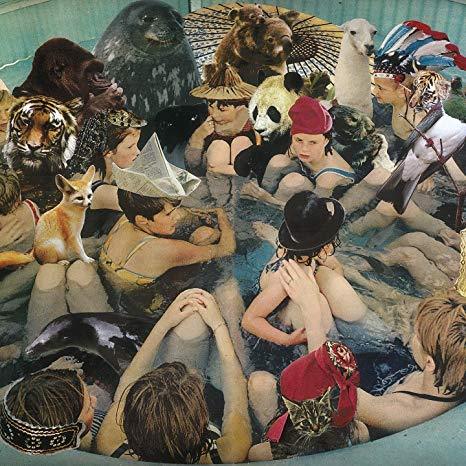
By the time that Panda Bear (aka Noah Lennox) released Person Pitch he had moved from Brooklyn, New York to Lisbon, Portugal, gotten married, and his band Animal Collective were rapidly growing into one of the defining bands of the 21st century, but even knowing all the ground that they covered in such a short span could hardly have prepared anyone for anything as singular as PP. The last solo record that Panda released prior to PP was his gorgeous, yet devastatingly poignant 2004 folk record Young Prayer, a tribute to his late father who passed that same year from brain cancer. On PP the analog instrumentation that defined YP and Panda’s past work with AC was opted out entirely in favor of compositional approach informed by plunderphonics that was spurred by his increasing fondness of producers like Madlib, and his formative musical influences like GAS, The Orb, and Daft Punk. The end result is a remarkably rendered patchwork of disparate sounds that span the scope of recorded music history tied together with Panda’s signature tenor, and his sharp ear for sequencing. While PP isn’t technically a plunderphonics record due to the incorporation of Panda’s vocals recorded fresh for these compositions, it’s still more wide-ranging, and superbly realized than any plunderphonics record released before or since. PP went on to completely shift the trajectory of indie music in the years since its release, and very few artists have managed to release an album that matches the scope of this dazzling breakthrough since.
PP is superbly sequenced into seven songs, two of which broach the 12-minute mark, with well-placed comedowns emerging right after the epics. The songs consist of loops cherry-picked from old records that Panda was exposed to during his time working at the Other Music record store in Brooklyn throughout the early aughts. The music shifts and contorts on a whim, segueing through different motifs with acute finesse while drawing through lines between various eras of music that may have been previously unthinkable, but nonetheless seem to sound like natural evolutions in Panda’s hands. Nothing sounds out of placed or forced because of the careful sequencing, and the precise tweaking of the samples that are being deployed. The opening song “Comfy in Nautica” perfectly sets the tone as a choir of vocals descend upon what sounds like an ascending roller coaster, and samples of racing cars. The construction is simple, but striking, and the tone he achieves is one of pure humility established with his homespun mantras of self-preservation “Coolness is having courage/Courage to do what’s right/Try to remember always/ Just to have a good time”. Whether it’s the dreamlike glide of “I’m Not”, or the cozy, glowing conclusion “Ponytail” the samples that Panda utilizes perfectly achieve the aesthetics of what the songs themselves are striving for. Everything is meticulously placed, and a single shift would disrupt the lean symmetry of the whole.
Nothing on PP underwhelms, but the high points are among the most remarkable achievements throughout the history of sample-based composition. “Take Pills” starts with what sounds like a lumbering stroll along a cobblestone road with percussion cribbed from Scott Walker’s “Always Coming Back to You” as Panda’s sighs guide the caravan forward unassumingly, but after several minutes the song transitions smoothly into jaunty surf rock propelled by a sample courtesy of “The Popeye Twist” by The Tornadoes. The shift is immense, but nothing about it scans as gimmicky or unnatural, and the ease with which the song transitions belies the ingenuity on display. “Bros”, almost certainly the most celebrated song of Panda Bear’s solo career, is a masterful 12 and a half minute tour de force that cycles through various eras of pop music’s history with the sharp precision of DJ set. Beginning with another sample from The Tornadoes (this time in the form of “Red Roses and a Sky of Blue”), “Bros” establishes a merry-go-round framework that never manages to sound stale within the course of its 12 and a half minutes. The acoustic guitar thrust sampled off of Cat Steven’s “I’ve Found a Love” alongside Panda’s harmonies that forever recall those of Brian Wilson propel the second act of “Bros” up until its life-affirming third act that gets a great deal of mileage out of a sampled vocal loop from The Equal’s “Rub a dub dub”. PP’s other epic, “Good Girl / Carrots”, spends its first 3 minutes spiraling through a dub freakout that eventually folds neatly into a rousing, spring-loaded midsection featuring some of the finest melodies that Panda has ever sung. As the song transitions into its carnival-esque, music box final act with a sample from Kraftwerk’s “Ananas Symphonie” Panda caps things off with a rejection of the sort of music nerd hive fandom that helped propel him to such heights in the first place as noisemakers soar along the periphery of the mix. The peaks of “Bros” and “Good Girl / Carrots” are astonishing, and those two songs alone cemented Panda Bear’s status at the vanguard of sample-based composition.
The lyrics throughout PP are heartfelt admissions from someone whose life had undergone massive shifts within the few years leading up to it. The release of AC’s landmark LP Sung Tongs in 2004 allowed him and the rest of AC to begin sustaining a career in music, and that very same year his father died, he decided to move from New York to Portugal after falling in love with a woman while on vacation from tour, and he soon after married her. The warmth seeping out of the music on PP reflects the atmosphere that Panda suddenly found himself immersed in much in the same way that AC’s superb 2003 record Ark was informed by the chaos of their lives in Brooklyn. “Take Pills” grapples with the history of Panda’s family’s reliance on anti-depressants “Take one day at a time/Everything else you can leave behind/Only one thing at a time/Anything more really hurts your mind”. “Bros” is a plea to his brother Matt for space to live his own life in the wake of their father’s passing “I’m not trying to forget you/I just like to be alone/Come and give me the space I need/And you may you may you may you may/You may find that we’re alright” while on “Good Girl / Carrots” Panda’s taking taste makers to task for trying to instill a false sense of superiority over those who aren’t as informed on underground music “Get your head out from those mags and websites who try to shape your style/Take a risk yourself and wade into the deep end of the ocean”. On the album’s closer, “Ponytail”, Panda offers up little more than “When my soul starts knowing/I am as I’d want to be/And I know I never will stop caring”, but it’s a perfectly fitting conclusion to the record, and as sincere a sentiment as anything I’ve heard on any album. The overwhelming sincerity of the music is tempered by a beyond-his-years wisdom that’s well-earned and deeply empathetic.
Panda Bear released three solo LPs following PP, and the approach on this record has gone on to inform all of the AC records that have followed in its wake. The influence of this record simply cannot be overstated. As easy as it is to roll your eyes at chillwave and the “vibe” generation, everyone from Tame Impala to Travis Scott owes an enormous debt to Panda Bear. As the bulk of their peers began to stick to their respective lanes Panda and the rest of AC continued to swing wildly between trends and genres throughout the last decade, leaving their stamp on various forms before pivoting wildly to where their muses led them next. Thankfully, Panda has continued to push his sound forward throughout his solo career as well, and even when returning to sample-based composition for his stellar 2015 fifth solo record, Panda Bear Meets the Grim Reaper, it marked a clear shift towards the influence of hip-hop and house, and away from the minimal techno meets psychedelic guitar pop that PP favored in abundance. No musical artist throughout the 21st century has covered as much ground as consistently or as impressively as Panda Bear, and PP still stands as one of the few truly idiosyncratic statements from any artist throughout the last decade. It’s aged tremendously well in the years since its release, and it still presents a disarmingly well-realized euphoria that couldn’t sound more radical in the moody, deconstructed landscape of music that has defined this current decade.
Essentials: “Bros”, “Good Girl / Carrots”, “Take Pills”
48 notes
·
View notes
Text
sanji will end up transforming after getting angry enough
Diable Jambe, although it makes Sanji stronger is more of a technique rather than a traditional power up. It’s more of a Gear 3rd rather than a Gear 2nd/4th. I believe Sanji’s next power-up will play more with the Devil theme that Oda has given Sanji. I believe Sanji will have an emotion based Hakuba like transformation, to where when he gets angry he heats up, his blood “starts boiling” and his facial expression changes. A berserk mode if you will. In my opinion Thriller Bark was a huge playground for Oda to forshadow future abilities and power ups. Nightmare Luffy -> Gear 4th Luffy, Sanji bursting into flames -> Hell Memories, Franky’s docking - Franky Shogun, Robin’ Big Tree -> Mil Fleur: Gigantesco Mano, Zoro burning Ryuma -> Zoro’s future Fire technique (he showed interest in Kinemon’s teqnique) … and finally the scene is similar to sanji reminds me of this panel):
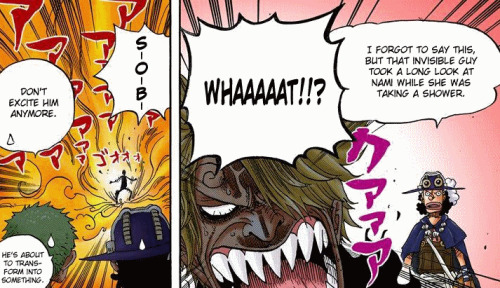
so sanji will have a devil form which he reaches through anger there’s a tokusatsu that we know Oda likes, which would be a much more explicit inspiration for the Germa 66 : Kamen Rider. specifically the villainous organization shocker
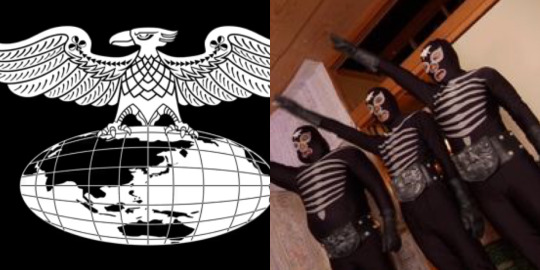
Shocker was a terrorist organization that planned on ruling the world (in the original manga is shown that Shocker had some influences over the governments of the world), with virtually all of its members modified in some way. The founders had mostly Nazi ties so it fits that germa66 not only references the nazis but the shocker organization from kamen rider Shocker’s scientists performed surgical alterations that gave the subject superhuman fighting abilities. Even the most basic Shocker soldier was tougher, stronger and faster than the average human civilian. The most powerful of their forces were the Kaijin, modified humans who were combined with animal DNA and human cybernetics to create living weapons. In an attempt to create the ultimate warriors, they were responsible for the rise of the very first Kamen Riders 1 and 2, whom defected and became the heroes who would ultimately lead to the fall of Shocker. and sanji and his siblings were altered genetically and the kamen riders specialty is the kamen rider KICK
In it Kamen Rider Black RX is a cyborg whose motif is a black grasshopper, which mirrors Sanji’s own epithet as Black Leg. Grasshoppers are known for their incredible spring like leg muscles that allow them to jump incredible heights which allow them to launch themselves in the air to fly. However he also has another motif and that is based on the sun. Kamen Rider Black RX is a photosynthetic warrior who is powered by the sun.
Since Kamen Rider is powered by the sun, he can set his legs and fists on fire to increase the lethality of his kicks and punches, which is basically what Sanji’s Diable Jambe does
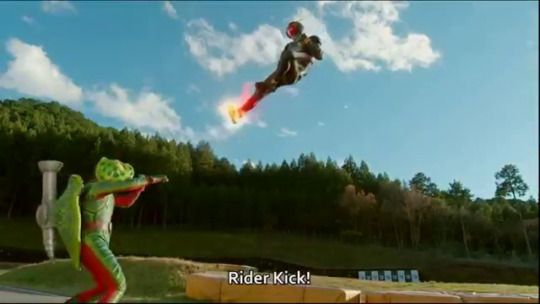
and kamen rider black who sanji is partly inspired from had a transformation called the prince of anger which he transformed when he reached a certain level of anger
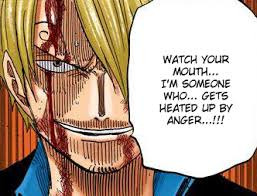
I like to add that when Sanji was fighting with Judge and thought about their past, his Dj(Poele A Frire) glowed brighter than than usual.

against judge
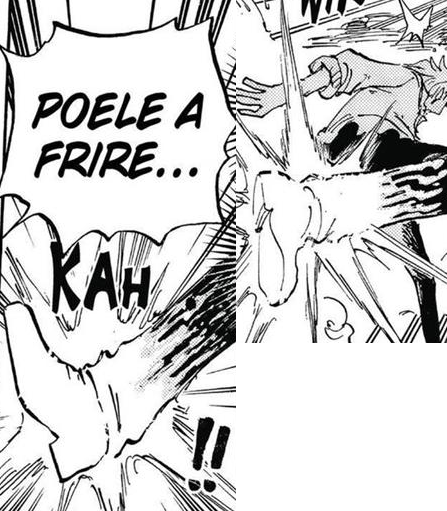
Diable Jambe and Poele A Frire against Doflamingo:
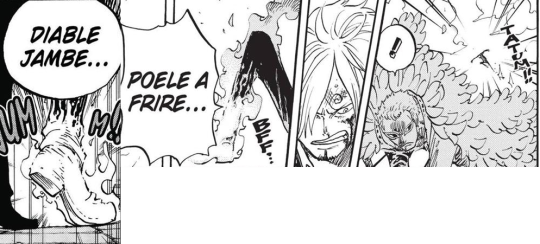
and sanjis raid suit is called stealth BLACK
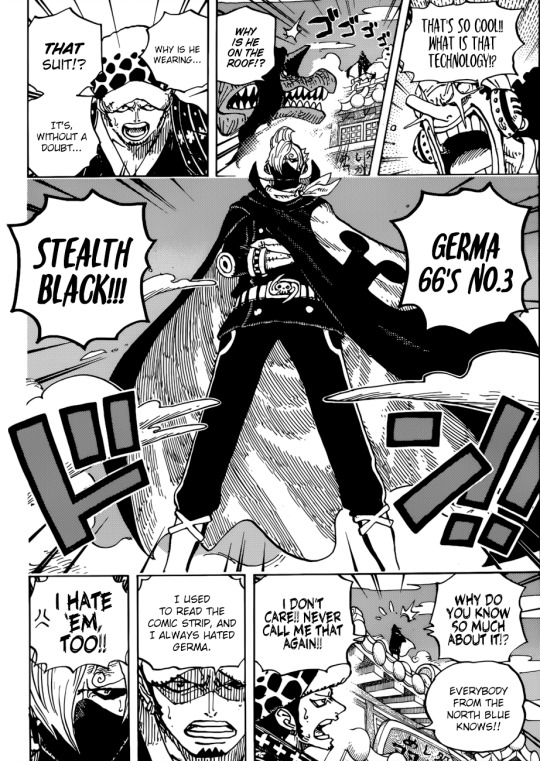
plus on sanji resembling kamen rider black rx who is solar powered
both sanjis experience as a child and duval was a reference to the man in the iron mask .
Though based on a real prisoner in the late 1600’s who Louis XIV forced to always wear a velvet mask to hide his identity and who was made to serve other prisoners, one of the most popular versions of the story is that of Alexandre Dumas, translated into a film in 1998. The prisoner, now shown wearing an iron mask, was Louis XIV’s twin brother
sanji had encountered the same fate as written in Alexandre DUMAS book (The Vicomte of Bragelonne: Ten Years Later). Declared dead for the country but condemned to wear a mask and to spend all his life in an horrible prison
and louis XIV was known as the sun king and kamen rider black rx is solar powered
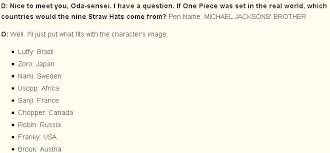
and sanjis and zoros rivalry parallels inuarashi and nekomamushis rivalry ( and inuarashi is called the ruler of the day and has a group under him that reference the three musketeers by alexander dumas (a french story ) and sanji was dressed up as a musketeer and oda said in an sbs that sanji in the real world would be french
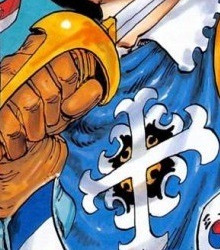
porche-chan . tumblr . com/post/134501849916/weve-located-zoros-fashion-twinkie-everyone
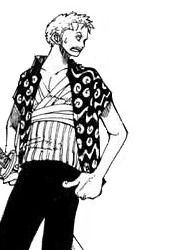
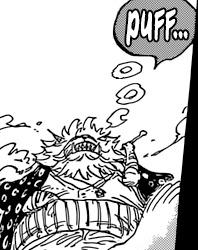
We’ve located Zoro’s fashion twinkie, everyone!. One Piece, chapters 82 and 809 porche-chan . tumblr . com/post/138118772526/i-made-an-observation-a-while-back-about#notes I made an observation a while back about Nekomamushi and Zoro being fashion twinkies, but now that I think about it, Inuarashi is wearing pinstripes, which is an early Sanji trademark:
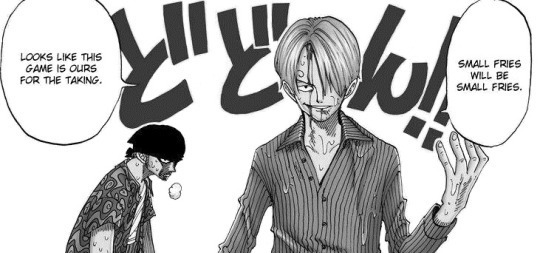
And as Wanda explains in chapter 809, Inuarashi and Nekomamushi seem to have a little bit of a volatile relationship, not unlike Sanji and Zoro:
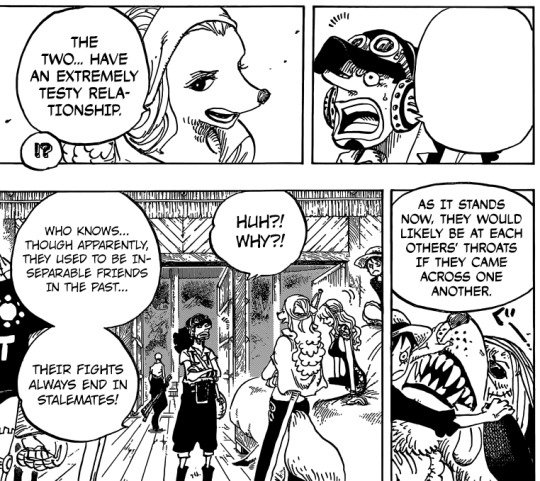
I have no fully formed theories regarding this, really, but there doesseem to be a recent influx (i.e. since Dressrosa) of duos whose dynamics are reminiscent of Zoro and Sanji. They all seem to exhibit a rivalrous and/or combative temperament, but there is either a history or discovery of working well together. And they all share, in some capacity, characteristics relatable to Sanji and Zoro in physical appearance:
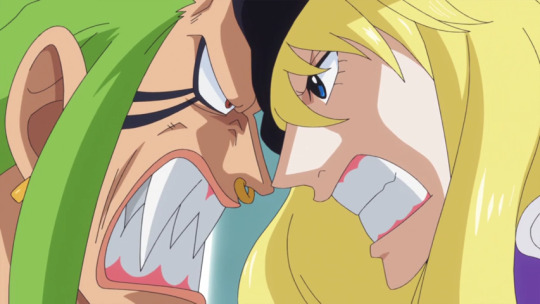
What I hope it means, though, is that we’re going to see some next level development in Sanji and Zoro’s relationship. Like, some Thriller Bark level type of stuff. porche-chan . tumblr . com/post…is-an-imposing-figure?is_related_post=1#notes Like Zoro, Nekomamushi is an imposing figure; strong, intimidating and perceptive. And like Zoro (with his naps and sake), Nekomamushi also exhibits hedonistic tendancies:
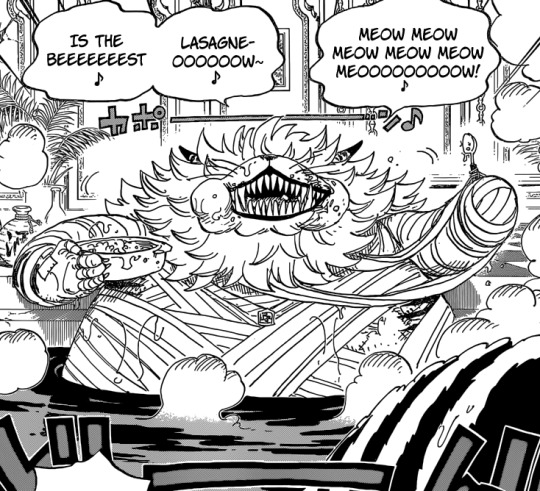
And most hilariously, they both share a general disregard for their poor, poor medical professional:
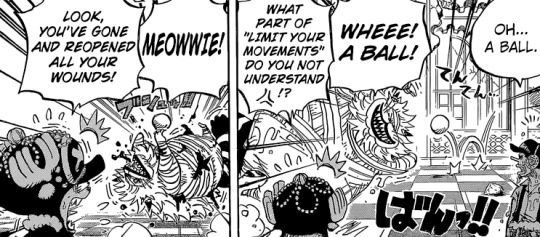
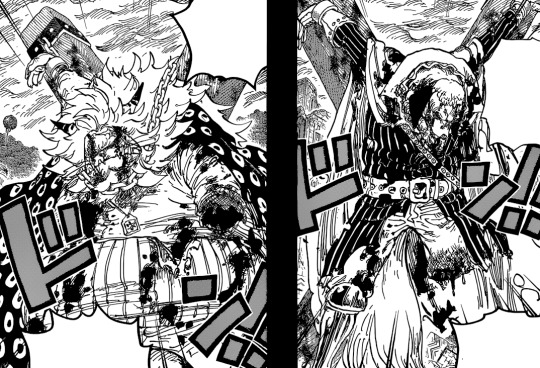
both nekomamushi and inuarashi (zoro and sanjis counterparts) losing the precise limb that could incapacitate zoro and sanjis respective fighting styles
about inuarashis similarities to sanji I have to point out that inuarashi has a group that operates under his command called the Inuarashi Musketeer Squad Among them are three minks known as the “Three Inuarashi Musketeers”, The name of the squad is a reference to the novel The Three Musketeers by Alexandre Dumas. a french story and oda stated in an sbs that sanji would be french in the real world
and this could make three allusions/connections that sanji has to the sun since inuarashi was the ruler of the day
sanji may end use white fire
It is a common misconception that the Sun is yellow, or orange or even red. However, the Sun is essentially all colors mixed together, which appear to our eyes as white. This is easy to see in pictures taken from space.
Even though red typically represents hot or danger, in a fire, it depicts cooler temperatures. Blue, on the other hand, while representing cooler colors in society, actually epitomizes the opposite in fires as some of the hottest flames all around. When all flame colors combine, they produce white, the hottest color of them all. (though some say blue fire is the hottest and it would fit for sanji to use use it since sanji is associated with the color blue )
sanjis transformation being a physical transformation where he goes into a devil form ( This has already been hinted at with Hell Memories where he remembers his past two years in order to enter a rage mode and Diable Jambe burns so intense it produces enough fire to cover the rest of his body:)
and “2. The Devil theme, started with Devil’s Leg and continued with Hell Memories could be greatly substantiated by having a mode in which Sanji becomes a Devil in terms of his personality as well. It could also lead to him earning a new moniker in the future, one that could better encompass what Sanji has become through out his journey, compared to the Black Leg that stuck closely to the teachings of Zeff before leaving the floating restaurant.”
zoro is connected to the ruler of the night nekomamushi in contrast to sanji with inuarashi while day = light night is connected to the dark so it fits for zoro to be the next dark king along with the parallels he has to Rayleigh like with the scar they both have on their eye. and there is the possibility that sanji will get the nickname light/sun king which is fitting since his backstory and duvals character is a reference to the man in the iron mask who was said to be the twin brother of the sun king. so it fits if sanji gets the nickname sun/light king which will be after sanji vs kizaru (or before and it will foreshadow the confrontation ) since kizaru uses light and sanji will probably have conquerors haki ( since any time we see someone with conquerors haki they have a nickname associated with royalty or they have royal blood
given sanjis connections to the sun I think sanji will have powers that connect to fire and light which fits with sanjis theme being satan the master of fire who was once lucifer (lightbringer)
megashadowdragon . tumblr . com/post/139186383737/sanji-represents-satan-who-was-once-lucifer-the
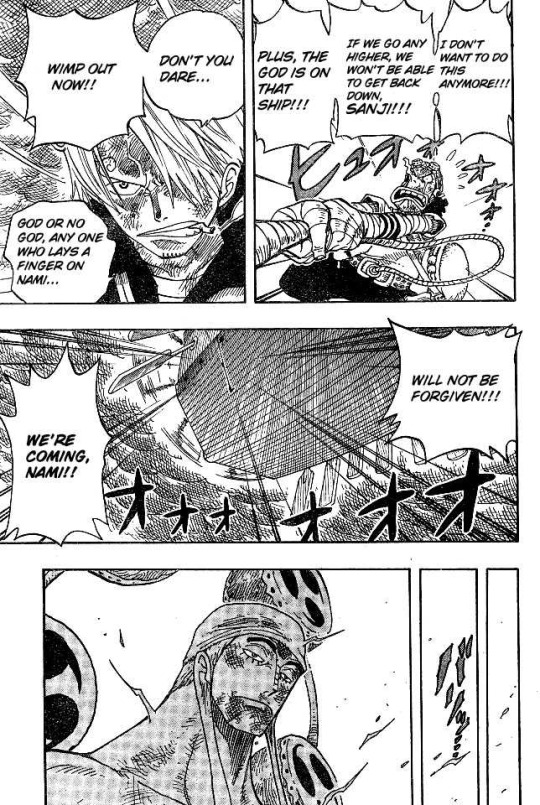
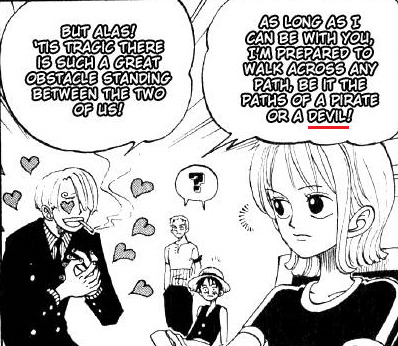
or maybe sanji will transform as a result of ussops death megashadowdragon . tumblr . com/post/138764551657/kizaru-will-kill-ussop-and-it-will-lead-to-sanji/embed
after all the scene in thriller bark was zoro telling usopp not to rile him up anymore or else he will transform and usopp would inadvertently cause sanji to be riled up enough to transform by his death after all we know how much sanji cares about protecting people and how angry sanji got in the usopp situation.
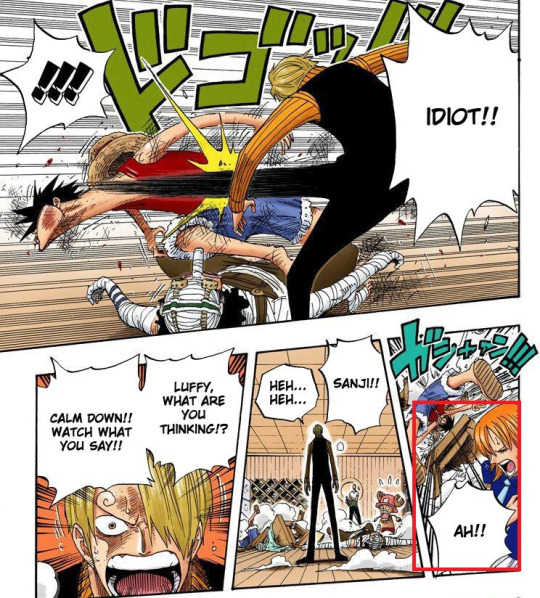
“You know what’s more amazing here than the fact that Sanji seriously kicked his captain’s rubbery ass? He almost hurt Nami by kicking Luffy right toward her direction. Nami was threatened enough to actually scream, not just dodge out of Luffy’s way. Sanji doesn’t apologize to Nami - hell, I bet he didn’t even realize that he almost hurt her. This really shows the heat of the moment, as well as how much Sanji was upset over Luffy’s words to Usopp”.
“sunnyul . tumblr . com/post/145669021863/you-know-whats-more-amazing-here-than-the-fact#notes
sanji was always someone who would defend usopp and in some way save him
sanji ended up going go against people who have harmed usopp two times before but each time the damage to ussop and the danger to ussops life that the person provided grown the first time with bon clay bon clay had beaten ussop up and stole his goggles when sanji was far away but didnt kill him and sanji wanted to get them back for ussop , the second time with jabura he beat ussop up and then tried to land the finishing blow but sanji got there in time and saved ussops life so the third time usopp will die by kizarus hands with sanji not being able to get there in time to save ussop and seeing ussops death (or coming in right after ussop died ) he would lose it if usopp dies that will be the end for usopp in contrast to nami just getting a bit hurt
@pernanegra
@sanjiafsincedayone
#one piece#op theory#op theories#op theorys#one piece theory#one piece theories#one piece theorys#op sanji#sanji#sanji op#Sanji One Piece#one piece sanji#black leg sanji#sanji black leg#Blackleg Sanji#Sanji Blackleg#kuroashi sanji#sanji kuroashi
27 notes
·
View notes
Text
sci fi ya au musings from twitter thread mostly nts
maybe i do want to write YA science fiction ya with gay and all my favorite self indulgent tropes and also plugsuits
I HATE MYSELF I IMMEDIATELY HAVE SCENES IN MY HEAD . ITS BEEN TWO GODDAMN SECONDS. I DONT EVEN KNOW WHO THESE CHARACTERS ARE YET tjinking about those rooms in that one ep of black mirror where youcan program jt tk show whatever you want on the walls. maybe projection of virtual reality vs reality as a major motif. simulations and distance... long distance relationships during a war in space action too... have to think about an enemy but maybe we rag on capitalism a littlle maybe some conglomerate is fighting a proxy war using aliens vs the govt the protags are in the military for theme.. war sucks bye but also theres dynamics i want
UM I CAN PUT BIG MECHA INNNNNNNN YEAHHHH anyway i want 2 loyal dog dynamics to juxtapose w eachother + platonic soulmate type protag duo, best friends , one girl one boy, theyre both equally important, some SHIT happens and theyre forced on different sides at some point one loyal dog is treated well, like an equal, will follow x to the end of the world the other is Not treated well. i want to explicitly make that relationship abusive so i can point at it in the text itself and have other loyal dog be like , that's not love. abandoned loyal dog gets adopted by main duo, ends up in a relationship w one of them (whichever one makes it gay), im ship girl with side character who inspires tf out of her, sort of like. theyre competitive and the side character is light years more skilled but girl wants the challenge, wants the chase, is fueled by the prospect of catching up so "wait for me" LAYS DOWN NONE OF THESE CHARACTERS HAVE NAMES OR DESIGNS OR ANYTHING BUT IM ALREADY ATTACHED TO THESE CONNECTIONS mc pair: one techy soft boy nerd who just wants to protect his family so thats why he agreed to help develop/operate tech bc he thinks this is how he can help headstrong pilot ace girl who has no one but wants to prove herself and make a name for herself so she'll be remembered she wants to win glory for herself and comes off as super confident but actually she's just. asuka evangelion except she doesnt crash and burn so bad bc she has the boy who sees thru it, you dont have to try so hard probably happens after a fight where she's reckless hes not one to get mad but this time he's pissed bc she was exceptionally close to dying, yells at her, why do you keep trying so hard to die kinda snaps her back to reality he wants her to rely on him more bc that's what hes here for anyway loyal dog defects from enemy + meets this pair after other loyal dog suggests he joins the crew, tech boy is kind to Everyone but loyal dog FORMERLY AN ASSASSIN ???????? TYPE?? SNIPER?? develops baby crush girl sips her drink :3c
I HAVE TO THINK MORE ABOUT THEM BC OH NO THEYRE CUTE but girl is chasing after some nb femme prodigy who she's rivals with and admires for more than just her skill theyre both emotionally constipated idiots tho so its like. (hand touch) thats enough for 100 years there is. so much tension. and prodigy seems so perfect on the outside but is actually in some kind of super strict fucked up program bc of her skill, and she hated it and is suffering ace pilot is the one to barge in headstrong and fuck everything up and get her out of there girl believes prodigy is amazing. really. incredible. a part of her feels like she'll never catch up . but even so watching prodigy walk into the unknown unflinchingly resolute ... it's both sad in a way bc she's being left behind but also she wouldnt have it any other way bc she thinks forward is the only way prodigy should be facing. its what inspires her. that strength ... h they definitely settle down together in the future tho bc i need ththattt
"when this is all over" said the prodigy, "come find me" this is so self indulgent anyway plotwise once both the govt and the enemy r revealed to be equally bad the main cast defect to a revolutionary group. they will Not win within the span of the novel but theyll have a small victory, very les mis one day more flavored, and even if they did not win they stood for something they believed in, did something to try and tell the truth... also i need more of a cast so i can kill characters off nice now all i have to do is fill all this in with world building and action and stuff and ill have a novel so many sci fi things have done the 2 pilot mind sync emotional thing right so if i do the same thing no one knows if i took it from one franchise or another i need to twist it around a little but i may have ideas haha i can. totally make this a part of my fucking huge sci-fi au really wanna call main girl lane and main boy khemrin . .. i cant unsee the girl as rey flavored so shes ending up w red hair and irish, but boy is SEAsian with a huge family, loyal dog who defects is african, prodigy is asian, other loyal dog feels south american prodigy... astrid is her real name but she may have a codename fsr? idk why i feel it. icarus? assassin defector... something that starts with an o or a d other loyal dog... i need to think but i also need to figure out the personalities of their respective pairs inserts minh as evil one. done. maybe mephis adjacent character for the... no mephis doesnt care abt anyone BUT hed be a great side character OH god what if au jonah and ambrose oh boy. FUCK jonahs probably there for some special task bc hes. attuned to some shit idk
I GUESS IM GONNA DEVELOP AMBROSE MORE ive only written him as a young adult but as a teen hes angry and rebellious and got drafted, ended up being a simple foot soldier but he meets jonah and a lot changes jonah's there on top secret bullshit, same program as astrid definitely has some shit to do With Experiments. astrid has enhanced eyesight/coordination on top of being an ace combat pilot, i think jonah might be able to open up warp gates or limited pocket space mephis is evil scientist who doesnt care abt casualties
I'm thinking about unnamed pilot lesbians and i am. enamored immediately holy shit god they're both so goal oriented and focused but once the fighting is finally over they finally allow themselves to embrace the intensity of their emotions for eachother and i am fucking perishing they were essentially raised as child soldiers so it's this clumsy process of trying to figure things out for the first time, this kind of innocent but intense and blooming love between two hardened soldiers, the years of war coming away when they're together for the first time actually fuck i did name them but i'm still not sure about ace pilot girl? i want to name her lane or something monosyllable, maybe i'll revamp raine and make her this oc instead... either way i'm just. ugh. UGH. FUCK. holy shit they love eachother so much
I"M GETTING REALLY FUCKED UP ABOUT THE POSSIBILITY OF THE PRODIGY (ASTRID) DYING IN THE LINE OF DUTY or well at least goes missing, presumed dead but raine just... doesn't believe it. astrid can't die. she's too amazing. there's no way fucking. huge disbelief. she refuses? raine going on a near suicidal self-appointed mission against commander's orders to rescue her, khemrin tries to hold her back but he can't, she' fucking gone speeding off on one of the fastest scouting ships she can hijack raine finding her alive but barely conscious in a damaged cockpit floating in space for who knows how long, raine unable to open the hatch and get to her but anchors her ship to hers, NOT EFFECTIVE BUT HER ONLY REAL CHOICE w/o compromising the air seal. makes the journey back astrid barely makes it to the space equivalent of a truck stop (unaffiliated) and raine calls for backup in panic and tries her best to tend to astrid's wounds an feed her and she's fucking PANICKING but trying so hard to keep it together astrid wakes up and raine's crying i don't have anything specific its just really soft and raine never Does this god when they meet again after the war, raine running her fingers over the scar left from astrid's helmet shattering h raine in a tux and astrid dressed like a princess and raine kissing her shoe sorry im gay bye
0 notes
Text
here's the essay i wrote once at 3 am on why deja entendu is brand new's best album
deja entendu is brand new’s best album in every sense—in terms of musical integrity, musical quality, imagery and aesthetics, lyricism, composition, and consistent themes—and here the fuck is why.
first, the album’s musical integrity. brand new’s debut album, your favorite weapon, featured a fast-paced, pop-punk sound; their sophomore album, deja entendu, features a slower, more emotional motif, what some would describe as straight up “emo,” or “experimental emo.” the progression from your favorite weapon to deja entendu can be described as a maturing of brand new’s sound from biting anger to hard hitting resentment and bitterness that slowly builds on top of itself as the album continues. this maturing creates a sound that better fits brand new’s cynical and bleak lyrics and themes, a relationship which will be discussed later.
though brand new’s other albums—your favorite weapon, the devil and god are raging inside me, and daisy—all have amazing musical quality, of course it’s my opinion that deja entendu holds the best out of all four. each album by brand new has a unique sound that fits with its aesthetic in its own way. deja entendu sounding the best is totally just my opinion lmao i can’t prove this point because it’s subjective but. just throwing that out there.
but what i can prove is that deja entendu’s imagery and aesthetics are the best out of all four of brand new’s albums given the way that they’re utilized and the context within the album’s sound. the cover of deja entendu depicts an astronaut floating above an ocean; the ocean is, of course, blue, and the sky behind him is orange. this color scheme is a reference to the juxtaposing imagery of drowning and burning explored throughout the album, and the ocean below the astronaut is a blatant tie-in to the album’s constant imagery involving the ocean. the astronaut floating may be a reference to the stagnant state one enters while being afflicted by depression due to the fact that the album is, in part, a metaphor for depression, an idea which will be explored later. as for its aesthetic, deja entendu primarily centers around water and the ocean, with lyrics like “i would kill for the atlantic,” “the coastline is quiet,” “i saw the hospital/it nursed the shoreline like a wound,” “you are the smell before rain/you are the blood in my veins” (which again explores a dichotomy between blue and red), “my body it leaks like a sieve,” “midnight in torrential downpour,” a song titled “jaws theme swimming,” and, of course, the last song on the album, “play crack the sky,” being a vivid description of two people drowning in a shipwreck (or committing suicide, but we’ll get to that later).
this is the big one, which is why it’s last: composition and structure of the album. its consistent and strong composition helps develop its theme. the album begins with “tautou,” its intro, that clocks in at just under two minutes; the intro features the two lines “i’m sinking like a stone in the sea/i’m burning like a bridge for your body” repeated over and over again. tautou establishes the water/fire, drowning/burning, and blue/red comparison that forges the album’s aesthetic and ties in with its themes. the next song is “sic transit gloria… glory fades,” a song describing a boy being convinced by his girlfriend to have sex with her despite being reluctant to do so (rape by coercion) as societal commentary on the fact that society pressures men to engage in sexual behavior and lose their virginity. the song’s defining lines are “die young and save yourself” (screamed in the chorus) and “up the stairs, the station where the act becomes the art of growing up;” both phrases signify that the main character of the song has to grow up fast and that growing up itself is unpleasant enough that death seems like a preferable alternative. the song’s powerful bass line (which makes me nut like five times every time i listen to it) and screaming in the background and the chorus reflect anguish and the boy being overwhelmed by his personal struggle. the next song on the album, “i will play my game beneath the spin light,” is about jesse lacey being homesick while on tour and desperately trying to stop anyone from seeing that homesickness, as reflected by the lines “i would kill for the atlantic, but i am paid to make girls panic while i sing” and “we won’t let you in,” respectively. the whole time jesse is talking about missing the east coast, building on deja’s oceanic themes, and the lines “the harpoon’s loaded/the cage is lowered/the water’s red” are a nautical metaphor for the fact that jesse is so far deep into touring and so far away from home that he can’t just quit and go back at this point. i will play my game transitions beautifully into “okay i believe you but my tommy gun don’t,” probably one of the most iconic songs on the album. at the beginning, it seems clear that it’s just going to be jesse talking about how great he is the whole time, starting off with the absolutely iconic lyrics “i am heavensent/don’t you dare forget,” but when the lyrics “ask me what it’s like to have myself so figured out/wish i knew” are sung, it’s clear that jesse is only openly narcissistic to cover up the fact that he is desperately unsure of himself. this will eventually be his downfall by the end of the album as these narcissistic tendencies send him into a downward spiral and he slowly crumbles until the album’s resolution. the lines “you’re holding onto your grudge,” spoken by jesse and directed to the person he is speaking to (most likely an ex lover), are ironic, because jesse himself is holding onto his grudge by writing an entire fucking song about how great he is. when jesse screams the lines “this is the reason you’re alone/this is the rise and the fall,” they are directed towards himself, referring to his self-destructive tendencies which are explored later in “the boy who blocked his own shot.” next up is “the quiet things that no one ever knows,” a song about a guy committing adultery, which is made apparent by the lines “reports of lovers’ trysts were neither clear nor descript,” “gave up my body and bed all for an empty hotel,” and “i lie for only you.” the line following “i lie for only you” is “i lie well, halleluh,” which is perhaps more character development of narcissism given the fact that the main character thinks he’s so good at keeping it secret that he can get away with adultery. the opening lines of the song, “we saw the western coast/i saw the hospital/it nursed the shoreline like a wound” further develop the album’s oceanic themes. the next song is the most iconic song on the album, the boy who blocked his own shot, and it’s about jesse breaking up with a girl out of sheer impulse. he is apologizing to her the entire song, promising to “grow old and start acting my age” (a nod to sic transit’s themes of growing up) and practically begging her to make amends; then, at the end of the song, his narcissism makes him take a sharp turn and he begins insulting her for being weak (“you are so fragile and thin/standing trial for your sins/holding onto yourself the best you can”) as a way to project his own shortcomings onto her. jesse is the one who is all of the things he is accusing her of being. brand new’s most iconic line, “you are the smell before rain/you are the blood in my veins,” comes at the end of the last verse, and it’s jesse finally admitting that he is basically nothing without this ex. the next song, “jaws theme swimming,” is once again about refusing to grow up and spiting authority (“some rules are made with our intentions to break and she defends it with a warped rationale,” “as we age we learn nothing/and my body still aches”) and the title was selected because the bass line is somewhat reminiscent of the jaws theme; the title is also another addition to deja’s aquatic aesthetic. the next song, “me vs maradona vs elvis,” is more development of the main character’s narcissism. it’s about him prowling around bars, getting drunk, and manipulating the girls he sleeps with into thinking he really loves them (“i will lie awake/and lie for fun and fake the way i hold you/that you fall for every empty word i say”). he experiences some remorse (“i almost feel sorry for what i’m gonna do”), but it’s not enough to make him stop, he values his ego over doing the right thing; but perhaps he thinks the only way to get people to love him is by manipulating them. this song is very slow paced and acoustic until the end; it’s very powerful, and its slow pace and explosive ending help deliver its message. the next song is “guernica,” a song about jesse’s grandfather dying from lung cancer; the song is named after a painting by picasso depicting the bombing of the city of guernica during the spanish civil war, effectively comparing the bombing to jesse’s mental torture. during the song, jesse refuses to visit his grandfather in the hospital and stall his tour, citing the fact that his grandfather would’ve wanted him to do that (“i submit no excuse/if this is what i have to do/i owe you everyday i wake”). he offers his body for his grandfather to use instead of his old, frail one (“please use my body while i sleep/my lungs are fresh and yours to keep”) and expresses his desperation and helplessness (“if i could i would shrink myself/sink through your skin to your blood cells/and remove whatever makes you hurt/but i am too weak to be your cure”). this is one of the few very fast paced songs on the album, and it ends shockingly and suddenly, with jesse gasping in a breath, possibly to mirror his grandfather’s last one or the fact that his grandfather’s cancer was in his lungs. the penultimate song on the album is “good to know that if i ever need attention all i have to do is die,” which clocks in at 7:00, the same amount of time it takes to say its fucking name. this song is jesse spitting in the face of the greedy men controlling the music industry for suffocating the creativity of his and other bands. a major theme in this album is resisting authority, whether it be society (sic transit), parental figures (jaws theme swimming), or businessmen (this song). another example of his narcissism, jesse describes himself freeing him and his friends from the music industry’s chains: “we burn the gallows they erect/and cut the nooses they tie for our necks” and “we prey as wolves among the sheep/and slit the necks of soldiers while they sleep.” the iron grip the music industry has on its artists is described by jesse as them keeping them “comatose but audible,” audible enough to make them money but not truly expressing themselves. the song is slow and bitter, but jarring in its sound.
the last song on the album is “play crack the sky,” its emotional climax and resolution, and it gets its own fucking paragraph. you see, the main character (jesse) has been on a downward spiral and sinking deeper and deeper into depression since the album’s beginning. he starts off with minor homesickness; then, as the album progresses, he begins to crumble because of abandonment and makes things worse by trying to cope with them by exploiting his narcissism and refusing to actually mature and deal with things in a healthy way. play crack the sky, which obviously describes a shipwreck, is popularly analyzed as a metaphor for the end of a relationship; however, i’m gonna make the bold move of saying that it’s actually a metaphor about suicide. the line “what they call love is a risk/cause you’ll always get hit out of nowhere by some wave and end up on your own” reflects jesse’s struggle with abandonment and his use of the word “always” appears to be him giving up, saying that he’ll never get better. the line “flooded the engines and radios” is a metaphor for how depression shuts down a person’s energy to do anything. the line “need you like water in my lungs” is jesse admitting to himself that his need for attention and love is toxic. the lines in the chorus “this story’s old but it goes on and on until we disappear” are a direct reference to the album title, “deja entendu,” which means “already heard.” now, let’s look at the beginning of the album, tautou. “i’m sinking like a stone in the sea.” the intro is describing the tragedy the album ends with. the album starts like how it ends and outlines how things are going to play out. it’s like romeo and juliet. not only does the album come full circle, but the constant nautical references throughout it are foreshadowing that the album is going to end with the main character drowning. so basically fuck you deja entendu is brand new’s best album
9 notes
·
View notes